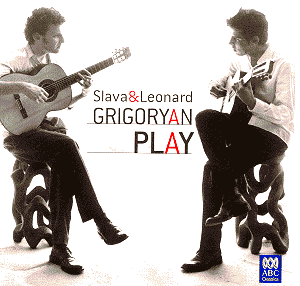If you like the guitar then you’ll be sure to
enjoy this disc from the Australian Broadcasting Corporation.
These two young brothers of Armenian origin, living in Australia,
play beautifully and in complete accord. At times it is hard to
tell there are two people playing. I often feel that the guitar
is heard to best effect without other instruments surrounding
it (Rodrigo’s "Concierto de Aranjuez" being one of the
obvious exceptions). This disc is a perfect example of this. The
notes coming from the instrument, when well recorded, as here,
are so sharply in focus that it is a truly thrilling experience.
The disc begins with "Tango Suite"
by Astor Piazzolla, the virtual inventor of the ‘nuevo tango’
of the 1940s and 1950s, whose writing for the bandoneon, that
unique take on the concertina, makes such music so exciting. His
suite was written for the Duo Assad, another pair of guitar-playing
siblings, in 1980, and has no echoes of sentimentality, coming
from a composer who wrote that "…the current tango is just
a nostalgic and dull imitation of those times…", referring
to the way in which the Buenos Aires of the 1950s "…was a
place where people wore tango, walked tango, where there was a
smell of tango all over the city". Beginning with a powerful
and erotic depiction of the heyday of the tango, the suite moves
on to a more reflective and serious mood. It ends with an allegro
that incorporates a lightness of spirit and a feeling of "all’s
well that ends well". Piazzolla’s Suite manages to embody
the powerful atmosphere of times past without the bitterness of
regret but rather with the pride of celebration.
Next on the menu is Kolobok by the duo’s father
Eduard. This tells the cautionary tale of a naughty little round
loaf (!) that comes to life and escapes from the window sill where
it was left to cool, and after several adventures, having managed
to survive encounters with a rabbit, a bear, and a wolf, is eaten
by the ever crafty fox. The music has a vibrant melody to depict
the little loaf, and often allows the two guitars to conduct a
dialogue.
Then comes music from Brazilian Radames Gnattali
(his father named each of his 3 children after characters from
Verdi operas!), whose "Retratos" is a folk-inspired
suite that pays tribute to four indigenous composers. The first
part is a "choro" (pronounced "shor-o" and
is Portuguese for "to cry") and is dedicated to Alfredo
da Rocha Vianna Jr., (1898-1973), a black Brazilian nicknamed
Pixinguinha who did much to promote Brazilian music at home and
abroad through his concerts and recordings of a genre of music
that found its popularity in the café culture of 1920s
Rio de Janeiro. The second movement, a waltz, is in homage to
Ernesto Nazareth (1863-1934), Brazilian composer and arranger,
conductor and bandleader, teacher and instrumentalist, and pioneer
of "choro". The third section is dedicated to another
stalwart of the Brazilian musical scene, Anacleto de Medeiros
(1866-1907), a popular dance music composer as well as teacher,
bandleader and performer, and is a Bavarian polka-like dance,
popular in the 1850s. The final movement of the suite is dedicated
to Chinquinha Gonzaga (1847-1935), piano teacher, "choro"
performer and prolific composer of dances, songs and music for
the theatre, who managed to achieve both fame and financial independence
in the early 20th Century, despite the prejudices that
dogged women at the time. The music takes the form of a lively
country dance and which is especially effective.
The fourth work on this disc is entitled "Evening
Dance" and is a delicious musical confection by American
guitarist and composer Andrew York, and the disc is rounded off
by another of the brothers’ father Eduard’s compositions "Day
dreams", a wonderfully wistful character piece.
The whole disc is delightfully infectious and
wonderfully played and can’t help but make you smile - a fitting
tribute to a couple of extremely talented young guitarists. I’m
certain we’ll hear more of them.
Steve Arloff
